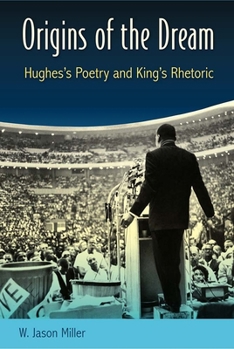Origins of the Dream: Hughes's Poetry and King's Rhetoric
Select Format
Select Condition 
Book Overview
For years, some scholars have privately suspected Martin Luther King Jr.'s "I Have a Dream" speech was connected to Langston Hughes's poetry, and the link between the two was purposefully veiled through careful allusions in King's orations. In Origins of the Dream, W. Jason Miller lifts that veil to demonstrate how Hughes's revolutionary poetry became a measurable inflection in King's voice, and that the influence can be found in more than just the one famous speech.
Miller contends that by employing Hughes's metaphors in his speeches, King negotiated a political climate that sought to silence the poet's subversive voice. He argues that by using allusion rather than quotation, King avoided intensifying the threats and accusations against him, while allowing the nation to unconsciously embrace the incendiary ideas behind Hughes's poetry.





